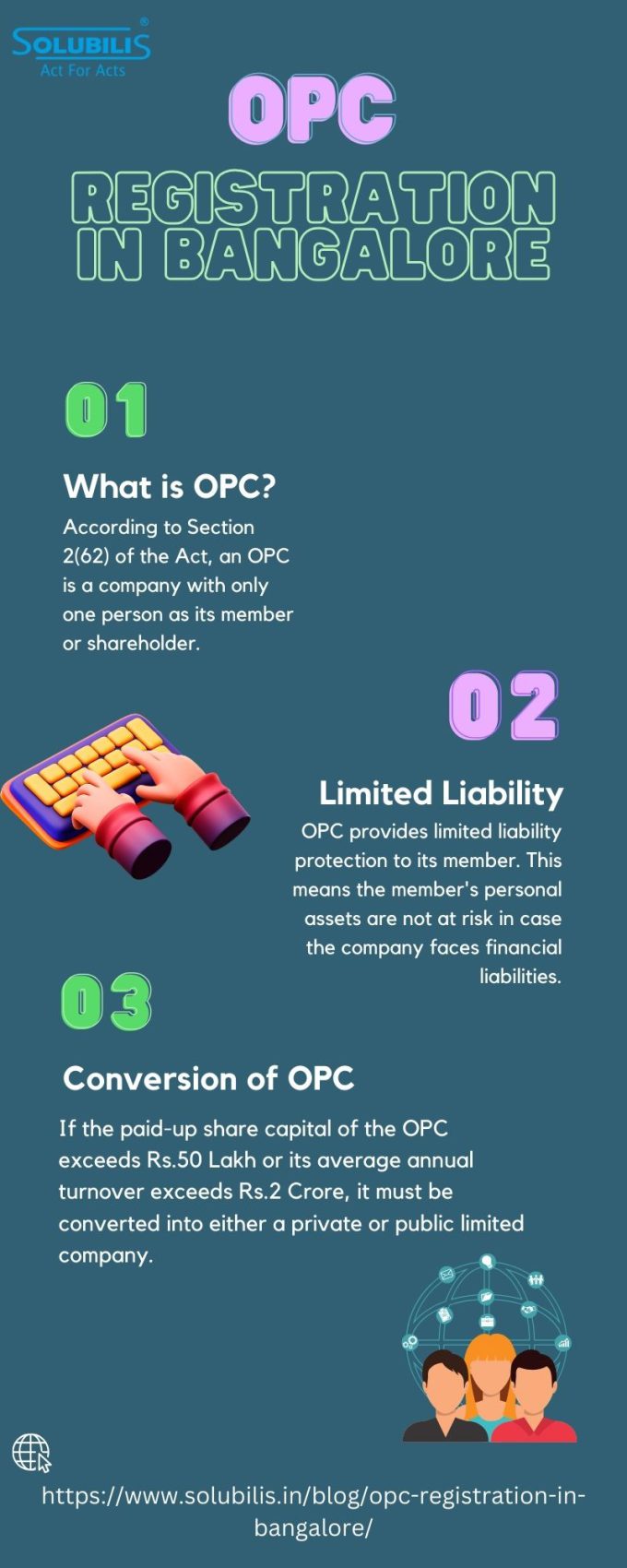OPC Registration in Bangalore

The Companies Act, 2013 brought significant changes to corporate laws in India, including the introduction of the One Person Company (OPC) concept. According to Section 2(62) of the Act, an OPC is a company with only one person as its member or shareholder. This means it’s a business structure where one individual owns and operates the company. OPCs are typically chosen by entrepreneurs who are the sole founders or promoters of their businesses, especially in the early stages. They prefer OPCs over sole proprietorships because OPCs with OPC registration in Bangalore offer various advantages.
Features of OPC
The OPC with OPC registration in Bangalore has the following features.
Single Member: An OPC can be formed with only one member or shareholder. This member holds all the shares of the company.
Limited Liability: Like other types of companies, an OPC provides limited liability protection to its member. This means the member’s personal assets are not at risk in case the company faces financial liabilities.
Separate Legal Entity: An OPC is distinct from its owner. It can own assets, enter into contracts, sue, and be sued in its own name.
No Minimum Capital Requirement: Unlike some other types of companies, there’s no mandatory minimum capital requirement to start an OPC. It can be registered with nominal capital.
Nominee Director: Every OPC must nominate a person as a nominee director in its memorandum of association. This nominee will take over the management of the OPC in case the sole member becomes incapacitated or dies.
Conversion: An OPC with OPC registration in Bangalore can be converted into a private or public limited company if it exceeds certain thresholds regarding paid-up capital or turnover.
Fewer Compliance Requirements: OPCs have fewer compliance requirements. They have relaxed reporting obligations and are exempt from holding annual general meetings.
Name with “OPC”: The name of an OPC must end with “One Person Company” or “OPC” to indicate its legal structure.
Tax Benefits: OPCs enjoy certain tax benefits available to companies, such as lower corporate tax rates.
These features make OPCs an attractive option for solo entrepreneurs looking to enjoy the benefits of limited liability and corporate structure while having full control over their business operations.
When OPC is converted into private limited company?
An OPC may be converted into a private limited company under certain circumstances, usually when it grows beyond the limitations imposed on OPCs. Here are some common scenarios where conversion from an OPC to a private limited company might occur:
Threshold Exceed:
If the paid-up share capital of the OPC exceeds Rs.50 Lakh or its average annual turnover exceeds Rs.2 Crore, it must be converted into either a private or public limited company.
Voluntary Conversion:
The sole member of the OPC with OPC registration in Bangalore may choose to convert it into a private limited company voluntarily for reasons such as expansion, bringing in more shareholders, or obtaining access to more funding opportunities.
Mandatory Conversion after Two Years:
If an OPC exceeds the thresholds mentioned above during any financial year, it must convert into a private or public limited company within six months of the date on which its paid-up capital or turnover exceeds the prescribed limits.
Business Expansion:
When an OPC’s business grows substantially, it may require a more robust corporate structure, including the appointment of directors and shareholders, which is facilitated by conversion into a private limited company.

Access to Capital:
Private limited companies may find it easier to attract investment capital from venture capitalists, angel investors, or through public offerings compared to OPCs. Conversion to a private limited company may be pursued to access such funding sources.
Legal Compliance:
Converting to a private limited company may also align with the long-term goals and compliance requirements of the business, including statutory obligations such as holding annual general meetings and appointing auditors.
In all these cases, the conversion process involves adhering to the procedures laid down in the Companies Act, 2013, and obtaining necessary approvals from regulatory authorities. It typically includes amending the memorandum and articles of association, obtaining shareholder approval, and filing requisite forms and documents with the Registrar of Companies (ROC).
Laws
Section 18 of the Companies Act, 2013:
This section deals with the conversion of a company from one type to another. It sets out the conditions and procedures for conversion, including the approval of shareholders and creditors, if applicable.
Rule 7(4) of the Companies (Incorporation) Rules, 2014:
This rule lays down the procedure for the conversion of an OPC into a private or public company. It specifies the documents required and the process to be followed for conversion.
Rule 41 of the Companies (Incorporation) Rules, 2014:
Rule 41 provides for the conversion of an OPC into a private or public company under section 18 of the Companies Act, 2013.
Overall, the conversion of an OPC with OPC registration in Bangalore is a legal process that must be carried out in compliance with the provisions of the Companies Act, 2013, and other relevant rules and regulations.
It involves various steps and documentation, and careful adherence to the prescribed procedures is essential to ensure a smooth transition to the new company structure.
Advantages of OPC registration
OPC has many advantages. They are listed below.
Limited Liability Protection:
OPC registration provides limited liability protection to the sole member. This ensures that their personal assets are safe from the company’s debts and liabilities. This helps in mitigating financial risks associated with the business.
Sole Ownership and Control:
OPC registration allows a single individual to own and control the entire company, enabling quick decision-making and operational flexibility without the need for multiple shareholders or directors.
Separate Legal Entity:
Upon registration, an OPC becomes a separate legal entity distinct from its owner. This grants the company the ability to enter into contracts, own assets, and sue or be sued in its own name, enhancing its credibility and business opportunities.
Ease of Compliance:
OPCs have fewer compliance requirements compared to other types of companies, such as private limited companies. They enjoy exemptions from holding annual general meetings and have simplified reporting obligations, reducing administrative burden and costs.
Professional Image:
OPC registration lends a professional image to the business, instilling confidence in customers, suppliers, and investors. It signifies commitment to legal compliance and corporate governance standards, which can enhance the company’s reputation and attract potential partners or clients.
Conclusion
In conclusion, OPC registration in Bangalore offers a multitude of benefits for solo entrepreneurs looking to establish their businesses. By embracing the advantages of OPC registration, entrepreneurs in Bangalore can not only enjoy the perks of corporate structure but also portray a professional image to stakeholders, paving the way for growth, innovation, and success in the vibrant business landscape of the city.

